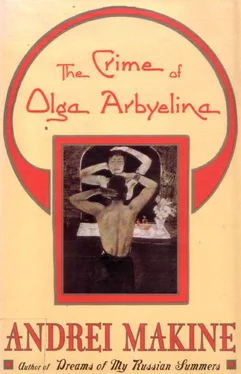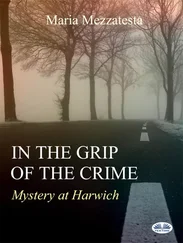
Andrei Makine
The Crime Of Olga Arbyelina
TRANSLATED FROM THE FRENCH BY GEOFFREY STRACHAN
'"My mother must have influenced God in my favor,' the accused states at the inquiry…"
Fyodor Dostoyevsky The Brothers Karamazov
"'What have you done to me! What have you done to me!' If we chose to think about it there is probably not one loving mother who could not, on her dying day, and often long before, address this reproach to her son."
Marcel Proust Filial Sentiments of a Parracide
Those that come first lie in wait for his words like mere eavesdroppers. Those that follow seem to appreciate something more in them. And they can easily be identified: they are much rarer than the merely inquisitive ones and come alone. They dare to draw a little closer to the tall old man as he slowly patrols the labyrinth of avenues and they leave later than the first comers.
The words the old man murmurs are swiftly dispersed by the wind in the icy light of a late afternoon in winter. He stops beside a slab, stoops to lift a heavy branch that lies like a fissure across the inscription carved in the porous stone. The inquisitive visitors cock their heads slightly toward his voice, while pretending to examine monuments nearby… They have just overheard an account of the last hours of a writer who was well-known in his day but is now forgotten. He died at night. His wife, her fingers wet with tears, closed his eyelids and then lay down in bed beside him to wait for morning… Now from the parallel avenue, where the dates on the gravestones are more recent, comes another tale: of a ballet dancer dead well before the onset of old age, who met his end repeating over and over, like a sacred formula, the Christian name of the young man, his lover, who had infected him… Next they steal some words spoken beside a squat pedestal surmounted with a cross: the story of a couple in the early nineteen twenties whose lives were tortured by the impossible hope of getting a visa to go abroad. He, a famous poet who no longer had a single line in print, she, an actress, long since banned from the stage. Living reclusively in their flat in St. Petersburg, they could already picture themselves being condemned, imprisoned, perhaps executed. On the day when, miraculously, their authorization to leave the country arrived, the woman went out, while her husband remained behind in a daze of happiness. To do some shopping in preparation for the journey, he thought. She went down, crossed a square (the passengers on a streetcar saw her smiling), emerged onto the quayside, and hurled herself into the sea-green water of a canal…
The visitors who have been listening out of pure curiosity are beginning to leave. A moment ago one of them crunched a fragment of flint beneath his heel. The old man drew himself up to his full gigantic height and fixed them with a somber gaze, as if angered at seeing them all there around him, frozen in their falsely preoccupied poses. Clumsily they make off, in single file at first, dodging between the tombstones; then forming a little group in the avenue that leads to the exit… During those few moments of discomfiture facing the old man they felt the whole disturbing strangeness of their situation. There they were beneath the bare trees at that cold, clear day's end, in the midst of all those Orthodox crosses, a few feet away from this man in his unbelievable greatcoat, black and disproportionately long. A man who, as if talking to himself, summoned up these beings in their very swift, very individual transition from life to death… It all felt pretty weird!
The little group hastens to dilute this feeling with words. Their voices grow steadier with lighthearted bravado; they joke; they suspect that the old man's stories will give rise to a fascinating discussion on the journey home. One of them remembers a surprising detail: the dancer, an obsessive collector, already hugely rich, used to buy up antiques and pictures at prices one malicious tongue called "obscene" and explained, half in earnest, half hamming it up, that he needed "to make provision for my old age." The debate is launched. They speak of the vanity of material things and the little caprices of great minds. Of the weakness of the flesh and of depravity. ("Let's face it, he was a genius killed by that nonentity of a gigolo," exclaims one.) And of how there was no perversion in it because love redeems all. "Love?!" A theatrically indignant voice reminds them that the wife whose fingers caressed the eyelids of the newly dead writer (yes, that faithful wife now at rest beneath the same stone as he) had been forced to tolerate a ménage à trois. The writer, already an old man, had needed the physical presence of a young woman for his inspiration… The arguments come thick and fast: the sense of sacrifice; art justifying everything; men's visceral selfishness…
The car taking them back toward the capital is filled with flashes of wit, laughter, and disillusioned sighs that accompany the occasional sanctimonious observation. They are happy to have succeeded in curbing the dread that recently held them in its grip. Dread has become an anecdote. And the old man, "a kind of enormous half-crazed priest, dressed in a surplice at least a hundred years old." Even the capricious drowned woman of St. Petersburg simply serves to illustrate the irrational nature of her fellow countrymen. Yes, that soul so given to excess, and so often described, with which, thanks to their Sunday outing, they have become better acquainted. They mention the names of various writers and a few long novels in which, if you looked carefully, you might well come across the drowned woman and the dancer, and the old man himself… After experiencing disorientation in a remote spot amid a drab, chilly landscape, it is an almost physical pleasure for them to find themselves once more in the familiar twisting streets, to recognize this café and that crossroads in their very characteristic Parisian look and with all the lights making it seem like night already… And when, a year later, or perhaps more, depending on the rhythm of their busy lives, a dinner party brings them together again, not one of the four visitors will dare to speak of those few moments of dread beneath the wintry sky. And this fear of admitting to it will greatly enhance the pleasure of their evening.
Their retreat has not deflected the old man from his regular round. You can see him now lifting a long tree trunk uprooted by last night's storm. The cross on one of the tombs has been turned into a kind of prop, bowed under the weight of the toppled tree. This task accomplished, the man remains motionless for a moment. Then nods his head several times and pours out his words once more, to melt in the cold transparency of the evening. The visitor now listening to him remains mesmerized by the power and appearance of the hands thrusting out from the sleeves of the greatcoat and grasping the tree's damp bark. Hands that themselves resemble powerful, knotty roots; marked with scars; lined with violet veins. This spectator would like to have been the only one gathering up the words scattered by the wind. To his annoyance a young woman with an indifferent and willful expression stops on the neighboring pathway, attempting to decipher upside down-or pretending to-the inscription on the tombstone that the old man has just liberated; then she begins listening as well… The dead person, whose name she has just mentally spelled out, a certain Count Khodorsky, was a cheerful adventurer.
Читать дальше













